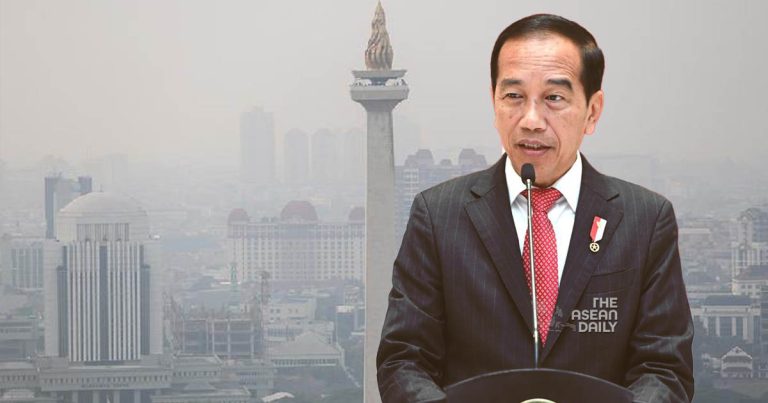15-8-2023 (JAKARTA) In the wake of Jakarta’s escalating air pollution problem, President Joko Widodo, popularly known as Jokowi, has called for immediate government intervention to address the health concerns caused by the hazardous air quality. With locals reporting respiratory issues and the city consistently ranking among the most polluted in the world, urgent measures are required to mitigate the crisis.
Jakarta has been grappling with severe air pollution for several months, exacerbated by the El Nino weather pattern. On the IQAir air quality monitoring site, Jakarta recently recorded the second worst air quality globally, highlighting the severity of the situation. A senior environment and forestry official confirmed that since June, Jakarta has consistently ranked as one of the world’s most polluted cities.
President Jokowi, who himself is suffering from a persistent cough due to the poor air quality, stressed the need for immediate action during a meeting with government ministers. He proposed implementing hybrid working arrangements and encouraged offices to adopt a combination of working from home and working from the office to reduce pollution. Tourism and Creative Economy Minister Sandiaga Uno revealed that the President has been experiencing coughing fits for four weeks, emphasizing the unprecedented nature of the situation.
To address the crisis in the short term, President Jokowi instructed relevant ministries and government agencies to intervene in improving the air quality in Greater Jakarta. These interventions include exploring weather engineering techniques to induce rainfall and implementing regulations to accelerate the adoption of emission limits. The President highlighted the impact of the long dry season and emissions from transportation and industrial activities, particularly those reliant on coal, as contributing factors to the heightened pollutant concentrations.
In addition, President Jokowi emphasized the importance of increasing the number of green open spaces in Greater Jakarta and allocated immediate funding for their development. In the medium term, the government aims to reduce reliance on fossil fuel-based vehicles and promote mass transportation alternatives. Furthermore, he highlighted the necessity of strengthening climate change mitigation and adaptation efforts as part of a long-term strategy to combat air pollution.
As part of the government’s comprehensive approach, Environmental and Forestry Minister Siti Nurbaya announced plans to introduce an environmental pollution tax to tackle Jakarta’s deteriorating air quality. The tax formulation is currently being prepared by the National Research and Investment Agency in collaboration with the Ministry of Environment and Forestry. To enforce stricter emission standards, the government also agreed to introduce random emission tests for all motorized vehicles entering office facilities.
While the government is taking steps to address the air pollution crisis, residents of Greater Jakarta have been experiencing the adverse health effects firsthand. Many locals, such as Ms. Nurul, a 29-year-old public servant, have reported suffering from acute respiratory infections (ARI) and persistent coughing due to the polluted air. The Jakarta Health Office revealed that the city witnesses approximately 100,000 cases of ARI each month among its 11 million residents. To protect themselves, residents are resorting to wearing masks, consuming healthy foods, and taking immune-boosting supplements like vitamin C.
Ms. Anggraini Puspita Sari, a 37-year-old resident of Bekasi, shared her experience of being diagnosed with ARI alongside her son. She described symptoms such as a persistent cough, sore throat, weakness, and her son experiencing fever. The prolonged exposure to polluted air prompted her to seek medical treatment to alleviate the discomfort and sleep disturbances caused by her severely inflamed throat.
The situation in Jakarta demands urgent action to combat the air pollution crisis. While President Jokowi’s directives and proposed measures offer hope for a cleaner and healthier future, comprehensive implementation and continued monitoring are crucial to address the immediate and long-term challenges posed by air pollution in Greater Jakarta.




